Owais Mughal
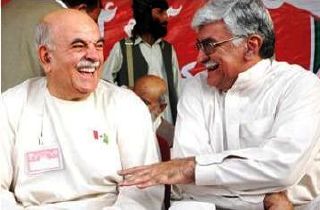 A news of significance from last week, which got buried among other high stake news is the alliance of Awami National Party (ANP) and Pakhtunkhwah Milli Awami Party (PkMAP). The new alliance is named as Pakhtoonkhwah National Democratic Alliance (PNDA) with Senator Asfandyar Wali Khan, President of the ANP, as is its chairman.
A news of significance from last week, which got buried among other high stake news is the alliance of Awami National Party (ANP) and Pakhtunkhwah Milli Awami Party (PkMAP). The new alliance is named as Pakhtoonkhwah National Democratic Alliance (PNDA) with Senator Asfandyar Wali Khan, President of the ANP, as is its chairman.
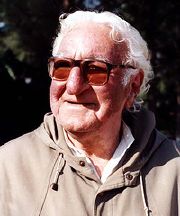 Historically, ANP has been a left-leaning and secular party whose ideology was influenced by the former Soviet Union (USSR). Although left-leaning, it has never been a ‘communist’ party in the strict sense. The PkMAP on the other hand derives its strength from the Pashtun nationalism and most of its support comes from the Pashtun area of Balochistan.
Historically, ANP has been a left-leaning and secular party whose ideology was influenced by the former Soviet Union (USSR). Although left-leaning, it has never been a ‘communist’ party in the strict sense. The PkMAP on the other hand derives its strength from the Pashtun nationalism and most of its support comes from the Pashtun area of Balochistan.
ANP’s predecessor, the National Awani Party (NAP), played an important role in formulating Pakistan’s constitution of 1973 and especially in crafting its clauses related to provincial autonomy. The leader of ANP (NAP) the late Wali Khan was particularly insistent on this point.
The fall of USSR left ANP rudderless as far as ideology was concerned. It had to adjust its politics in the shadow of the Afghan war and in its aftermath. For much of this time the slogans of greater Pakhtunkhwah looked distant. Early and mid 1990s even saw both ANP and PkMAP forming alliances with rightist Muslim League party of Nawaz Sharif in both center as well as in NWFP and Balochistan. This was probably the biggest ideological U-turn of ANP. This move may have cost them lots of disillusioned supporters.
The vacuum created by the ideological confusion in Pashtun nationalist party ranks was very quickly filled by the rise of religious parties. So much so that in 2002 elections both ANP and PkMAP got routed from the western provinces of Pakistan. Mahmood Khan Achakzai of PkMAP was the only Pashtun nationalist leader who got elected in 2002. The situation became such a sour-grape for ANP that few month ago Gluam Ahmed Bilour of ANP gave this satement:
“MMA should immediately enforce shariat in NWFP.”
His was probably hoping that people will soon get fed up with the laws made and implemented by MMA and may come back to the ranks of nationalist parties. I believe the recent Lal Masjid operation in Islamabad as well as 12th May incidents in Karachi have provided the necessary impetus to Pashtun nationalist parties to revive their support and ranks. Most of the people affected in these two incidents hailed from NWFP districts. Add to this the likelihood of coming elections in late 2007, it comes as a logical next step that ANP and PkMAP join hands.
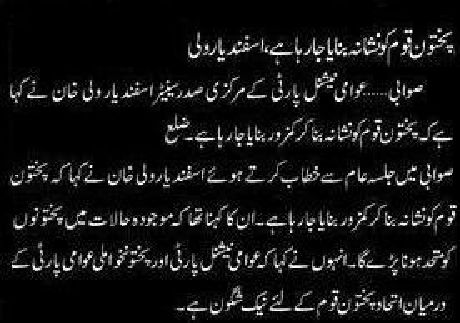
The alliance between ANP and PkMAP was announced on July 25, 2007 and its initial demands include the creation of a separate province for Pashtuns. This proposal calls for including the whole of North West Frontier Province (NWFP), Mianwali and Attock districts from Punjab and 11 districts of Balochistan (Chaman, Quetta, Zhob, Sibi, Pishin, Qila Abdullah, Qila Saifullah, Musakhel, Loralai, Balarkan and Ziarat) in the new province to be called Pakhtoonkhwah. Pashto is proposed to be its official language. The alliance leaders also call for the Pashtuns to see which ethnicity is suffering the most in the recent spate of violence.
Some of the demands of this new alliance outright challenge the beliefs of many of us. Many Pakistanis believe in a strong center and provincial boundaries are considered holy. The demands of the alliance are a direct challenge to this thinking. The alliance however, has the potential of taking people away from the violence – the violence of the type which we are currently seeing in western provinces – so for that reason alone it could be a good news. But what might this return to ethnic politics mean in the long run? I am not sure. A friend remarked to me the other day that this is like letting loose a monster to tackle another and they may end up becoming even more monstrous.
At a personal level I am sympathetic to the demand for a new province and new official language. My argument is that it should be determined through referendum and if that is what people want then people’s will should be respected. For example, I am not sure if people of Mianwali want to go with this idea. They may more likely vote for a Seraiki province than Pakhtoonkhwah, therefore these decisions should be based on voting/referendums all along. The principle of giving smaller regional groups the space to operate democractically is, however, a good one.
There is one more demand of this alliance which I find very legitimate. Quoting the daily News it goes like this:
The Pakhtoon leaders said that the federation should safeguard rights of the federating units on the basis of equality, ensuring the constitutional institutions key role in this context.
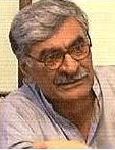
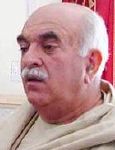 This is not end of story here as there is yet another dimension to this alliance. A lesser known fact is that ANP and PkMAP both have a very strong support in Karachi city. Their call for Pashtun unity in Karachi area is probably timed around elections as ANP-PkMAP may be eyeing a few provincial or even a National Assembly seat from the city. The events of May 12 have only highlighted the importance of this dimension. Since May 12 incident both Asfandayar Wali and Mahmood Khan Achakzai have made several trips to Karachi and talked about Pashtun unity. In the local city politics context it may cause even more polarization of people on the basis of ethnicity and to me it does bring back the haunted memories of what the city went through in fifteen years period of 1983-1998. While pride in one’s ethnic identity is a good thing, politics based of ethnic rivalries cannot be good for the country.
This is not end of story here as there is yet another dimension to this alliance. A lesser known fact is that ANP and PkMAP both have a very strong support in Karachi city. Their call for Pashtun unity in Karachi area is probably timed around elections as ANP-PkMAP may be eyeing a few provincial or even a National Assembly seat from the city. The events of May 12 have only highlighted the importance of this dimension. Since May 12 incident both Asfandayar Wali and Mahmood Khan Achakzai have made several trips to Karachi and talked about Pashtun unity. In the local city politics context it may cause even more polarization of people on the basis of ethnicity and to me it does bring back the haunted memories of what the city went through in fifteen years period of 1983-1998. While pride in one’s ethnic identity is a good thing, politics based of ethnic rivalries cannot be good for the country.
Whether this loose alliance of ANP-PkMAP will result in an electoral alliance is still to be seen. Yesterday’s news is that the verbal agreement between Asfandyar Wali Khan and Mehmood Khan Achakzai has not materialized on ground yet. So far no headway has been made to form bodies for making recommendations for a merger or formation of an electoral alliance of these parties. I guess, only time will tell how this alliance plays out in long term.
Now looking beyond this particular alliance, there is a strong ethnic under-current running in Pakistani politics today. This factor is stirring the pot slowly and the outcome can become a major defining force in the future of Pakistan politics. Possibly as major a force as religion has become today. Those who think about Pakistan politics should keep a close watch on how this under-current develops. People didn’t talk about it in open but these differences were very visible even in CJP reinstatement issue where it was very clear which geographical area of Pakistan were drawing support for or against him.
In next elections, I will not be surprised if Baluch nationalist parties sweep the whole Baluch belt of Baluchistan as well as make inroads into PPP’s stronghold in Southern Karachi towns.
Therefore the need of the hour is to face the reality and be inclusive of regional parties; To build unity through diversity; To acknowledge and address the legitimate concerns of smaller provinces and groups, and to create the mechanisms for them to participate meaningfully in national politics.
I will here present the argument that most of the regional parties have played their national roles whenever they are considered worthy of it. ANP, PkMAP, MQM, BNP, JWP have (or had) all joined hands with federal parties in the past. ANP uses English and Pakistan’s national language Urdu only at its website to promote their message. Ms Hameeda Khoro whose past has been associated with Jiyay Sindh party has played continuous active role at federal level.
We can see a stronger Pakistan with more and more participation of regional and provincial parties at National level. Most of the regional issues and people behind them need an acknowledgement of their issues at Federal level. They sometimes play the role of an angry child who needs more recognition. Just listen to them, talk to them and at the very least try solving their issues sincerely. We will get a stronger Pakistan in return.



















































Tip O’Neil, the legendary Speaker from Boston, famously said, ‘all politics is local’.
And local also means ethnic. And there is nothing wrong with ethnic politics.
No matter what you will say, anthropologist will tell you, that the flavor of region changes about every 40 to 70 miles. The people, the language, the clothing, the food. It is fact of humanity, accept it and work with it.
It is also difficult to compare Pakistan with any other country, because of its size, population density and the (lack of ) infrastructure. Especially, with a developed country.
What compounds the problems are bad models of governance. Good governance in a democracy is a three part problem. Effective and efficient administrative units. Informed electorate and good leadership.
The effective administration in Pakistan is hampered by top down control instead of bottom up mandate. Power at each level is amassed and concentrated and is inherently subject to over-rule by the superior level. One telephone call can change the outcome of the file. Too many people go to the top to arrange that phone call. A recipe for corruption.
Additionally, the local ethnic balance needs an effective oversight by a national mechanism.
Provincial Civil Service (PCS) was a good idea run into ground by Civil Service of Pakistan (CSP). Where the PCS should have been ascendant, the CSP took over the slots. And then they ran it like viceroys, their personal domains. And even after the “reforms of 1973”, the core level continues to function as it did before the reorganization. The break up into various administrative units was just a change in the process, not the control nor the mind set.
What should have happened is that PCS system runs the local show and CSP system would augment that the national goals and objectives work effectively. Thus the local tehsildar or thanaydar does not create his own fiefdom or an enclave. The top slots in each of the provinces and at each level should have never been with CSP, but PCS officers. In reality, the reverse.
This is why it is so critical to improve the local courts and at the same time, take the federal and provincial system down to the local level. Create tiers of administrative units, local, provincial and federal.
Sultan Musharraf missed the opportunity to fix this. He came close but did not understand the complexity of the system because he was trained in the top-down system. Or perhaps did not have the desire to fix it. He needed the cronies to keep him in power.
If the administrative units and systems are laid out properly, then the political process is not has only one mandate: to carry out the will of the people. The two go hand in hand.
The second part of the problem, the informed public is a serious issue. Take the bill for the 18th amendment, approved by the NA and pending approval by Senate. I have not been able to find an complete copy of the bill anywhere.
Worse, the press banner lines are at best misleading. The News has the worst headline. And I suspect most people are commenting on things they have not read.
Amazingly, in this proposed amendment, there is a provision of Right to Information. And yet, this very information about the proposed amendment is not available. So much for the rule of law.
People in Pakistan are kept in the dark. Media, both print and electronic, a willing accomplice.
Finally, the leadership. Well, that is process of trial and error as well as the diversity of resources. Pakistan keeps getting stunted on the trial and error process. Not enough errors of trials have sunk in because of the gaps. People like muscles, lose ability to remember the errors with lack of flexing. And diversity will come where there are more points of entry into the process.
Miles to go before we sleep.
Usman thanks for your comments here.